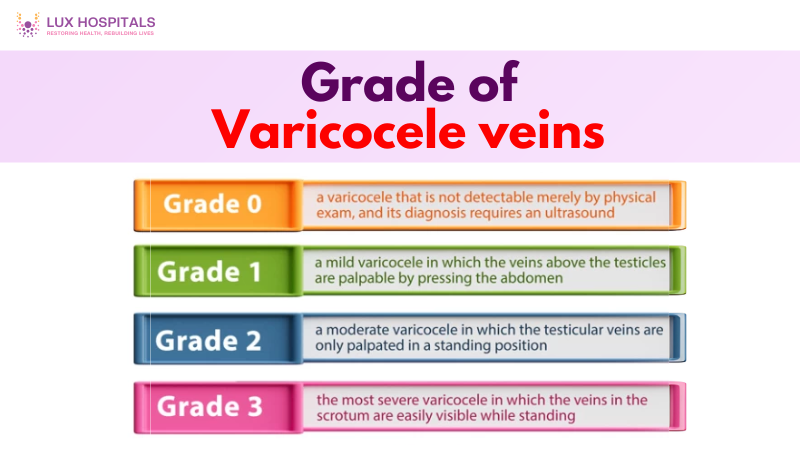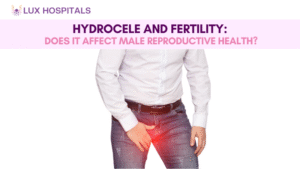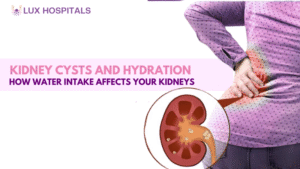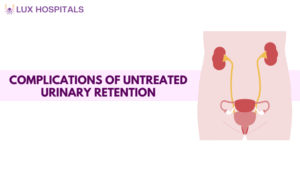Varicocele Grading: How It Progresses and When to Seek Help

If you’ve ever felt discomfort or a heavy sensation in your scrotum, it could be a sign of a varicocele. While many people may not even realize they have it, understanding varicocele grading is key to knowing how serious the condition is and when to seek help. In this blog, we’ll break down what varicocele grading means, how it progresses, and what your options are for treatment.
What Is a Varicocele?
A varicocele is comparable to varicose veins in the legs. is an enlargement of the veins in the scrotum. These swollen veins can lead to discomfort, testicular shrinkage, and even infertility. Varicocele causes include faulty valves in the veins, which disrupt normal blood flow, leading to pooling and swelling. While some people experience no symptoms, others may have noticeable discomfort.
Why Varicocele Grading Matters?
Varicocele grading helps doctors assess how advanced the condition is. It’s classified from Grade 0 (subclinical) to Grade 3 or sometimes Grade 4 in certain diagnostic scales. This grading helps guide the appropriate varicocele treatment, whether it’s monitoring or surgery.
Understanding Varicocele Grades
Varicocele Grade 1
This is the mildest form, where the varicocele isn’t visible but can be felt during a special breathing technique called the Valsalva maneuver. Usually, varicocele symptoms are minimal at this stage, and many don’t require immediate treatment.
Varicocele Grade 2
At this stage, the Varicocele can be felt without the Valsalva technique but is still not visible. Some men may start noticing mild discomfort or a dragging sensation in the scrotum. Varicocele grade 2 might need observation and lifestyle changes.
Varicocele Grade 3
The enlarged veins are visible through the skin and easily felt. Varicocele grade 3 is often associated with pain, testicular shrinkage, and a higher risk of fertility issues. This is usually when varicocele treatment becomes necessary.
Varicocele Grade 4
Although not always included in clinical grading, some advanced diagnostic tools categorize severe, visibly pronounced varicoceles as varicocele grade 4. These require prompt medical attention and may need varicocele surgery to prevent complications.
Varicocele Symptoms
Dull, aching pain in the scrotum
- Heaviness or swelling
- Visible or palpable veins
- Discomfort that worsens after standing or exercise
- Fertility issues
If you’re experiencing any of these varicocele symptoms, it’s time to consult a doctor.
When to Seek Help?
You should seek medical advice if:
- You feel persistent scrotal pain
- There’s a visible lump or swelling
- You’re facing fertility issues
- Your daily routines are being disrupted by the discomfort.
Early diagnosis and intervention can make a big difference.
Varicocele Treatment Options
Depending on the varicocele grading, your doctor may recommend:
- Watchful Waiting: For mild grades with no symptoms
- Lifestyle Changes: Avoid heavy lifting, wear supportive underwear
- Medication: To relieve pain
- Minimally Invasive Surgery: Like varicocelectomy or laser-assisted procedures
- Varicocele Surgery: Often advised for varicocele grade 3 and above
Conclusion
More than just a medical classification, varicocele grading is an important tool for diagnosis and treatment selection. The symptoms of varicocele should not be disregarded. Early evaluation and treatment can protect your health and fertility. Book a consultation at Lux Hospitals and take the first step toward relief and recovery.
Frequently Asked Questions
Varicocele causes include faulty valves in the veins of the spermatic cord, leading to blood pooling and vein enlargement.
Yes, even a varicocele grade 1 or grade 2 varicocele can cause discomfort, infertility, or dull pain, particularly after prolonged standing or physical exertion.
Varicocele surgery is recommended when the condition causes pain, infertility, or affects testicular growth. It’s often the treatment of choice for higher grades like varicocele grade 3 or grade 4.
The treatment depends on the varicocele grading, symptoms, and impact on fertility. Minimally invasive techniques including laparoscopic or microsurgical repair are among the options, as are medication and observation.
Yes, an untreated varicocele may progress from a lower grade to a higher one, increasing the risk of complications like infertility or chronic pain.
Without treatment, a varicocele can worsen over time. The veins become more dilated, and symptoms can intensify. In some cases, testicular damage and infertility can result from prolonged poor blood circulation. Understanding varicocele grading helps monitor progression and decide the right time for treatment.




















